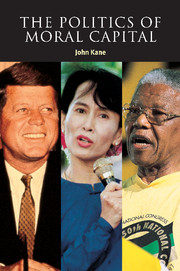Book contents
- Frontmatter
- Contents
- Acknowledgments
- Introduction
- Part I Moral capital
- Part II Moral capital in times of crisis
- 3 Abraham Lincoln: the long-purposed man
- 4 Charles De Gaulle: the man of storms
- Part III Moral capital and dissident politics
- Part IV Moral capital and the American presidency
- Epilogue
- Bibliography
- Index
4 - Charles De Gaulle: the man of storms
Published online by Cambridge University Press: 22 September 2009
- Frontmatter
- Contents
- Acknowledgments
- Introduction
- Part I Moral capital
- Part II Moral capital in times of crisis
- 3 Abraham Lincoln: the long-purposed man
- 4 Charles De Gaulle: the man of storms
- Part III Moral capital and dissident politics
- Part IV Moral capital and the American presidency
- Epilogue
- Bibliography
- Index
Summary
In the midst of dangers, the troops were ready to obey him implicitly and would choose no other to command them; for they said that at such times his gloominess appeared to be brightness, and his severity seemed to be resolution against the enemy, so that it appeared to betoken safety and to be no longer severity. But when they had got past the danger and could go off to serve under another commander, many would desert him; for there was no attractiveness about him, but he was always severe and rough, so that the soldiers had the same feeling toward him that boys have toward a schoolmaster.
Xenophon, The AnabasisGeneral Charles de Gaulle had been in political retirement for some years when, in May 1958, a military rebellion in Algeria plunged France's Fourth Republic into crisis. De Gaulle was neither surprised nor displeased. He had forecast disastrous failure for the faction-ridden Republic at its birth, twelve years previously. It had been a source of irritation to him that the “regime of parties,” as he contemptuously called it, had survived so long, though the truth was that the republic had, with the help of American aid, served the country moderately well during the post-war period. But increasingly short-term governments, already shaken by a series of international crises, proved unequal to the problem of Algeria.
France had been trying since 1954 to retain its North African colony in the face of armed resistance from the Algerian Liberation Front (FLN).
- Type
- Chapter
- Information
- The Politics of Moral Capital , pp. 83 - 112Publisher: Cambridge University PressPrint publication year: 2001

